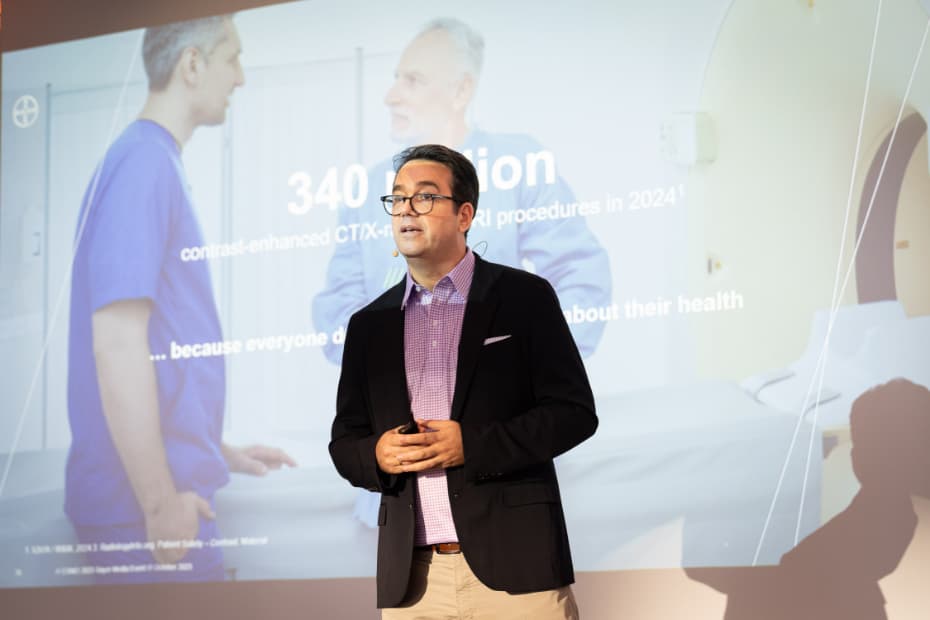Bayer unveils vision to transform prostate cancer care ahead of ESMO 2025
Redefining prostate cancer diagnosis and care
Bayer has outlined an ambitious new vision for transforming prostate cancer care globally, emphasizing innovation in imaging, early detection, and patient-centered treatment strategies. Presented ahead of the European Society for Medical Oncology (ESMO) 2025 Congress, the initiative reflects Bayer’s commitment to redefining standards in oncology and radiology through scientific rigor and integrated healthcare solutions.

Dr. Peter Seidensticker, Head of Medical Affairs Radiology at Bayer
Prostate cancer remains one of the most commonly diagnosed malignancies in men worldwide. Despite progress in screening and therapeutics, significant challenges persist—particularly in achieving earlier diagnosis, minimizing overtreatment, and ensuring equitable access to advanced diagnostic tools. Bayer’s strategy aims to bridge these gaps by fostering collaboration across radiology, oncology, and pharmaceutical disciplines.
Driving a paradigm shift in prostate imaging
A central focus of Bayer is the transformative potential of magnetic resonance imaging (MRI) in prostate cancer care. MRI has become an essential diagnostic tool, offering high-resolution, non-invasive imaging that allows clinicians to better detect and characterize clinically significant disease.
Global adoption of prostate MRI is accelerating rapidly, with annual growth of approximately 5%, compared to 2% across general MRI procedures. In 2024, an estimated 600,000 prostate MRIs were performed in the United States and other countries with advanced imaging capabilities—a clear indication of growing clinical confidence in the modality.
The PROKOMB study: Validating MRI as a first-line diagnostic tool
Bayer recently supported the PROKOMB study, a large-scale clinical investigation involving nearly 600 biopsy-naïve men, designed to assess MRI’s diagnostic performance in detecting clinically significant prostate cancer before biopsy.
Professor Bernd Hamm, MD, Department of Radiology, Charité–Universitätsmedizin Berlin, presented the study’s results, stating:
“Results from the PROKOMB study support a paradigm shift: if prostate cancer is suspected, MRI can serve as a first step. If the MRI shows abnormalities, a targeted biopsy can be performed. If the MRI is normal, no biopsy is needed, sparing the patient an invasive, potentially harmful procedure.”
These findings underscore the potential of MRI-guided pathways to improve diagnostic precision while reducing procedural burden and healthcare costs.

Dr. Peter Seidensticker, Head of Medical Affairs Radiology at Bayer.
Gadoquatrane: Next-generation MRI contrast agent under review
Dr. Peter Seidensticker, Head of Medical Affairs Radiology at Bayer, added, “As a leader in radiology, we are proud to support crucial research such as the PROKOMB study and will continue driving innovation in medical imaging for the benefit of patients.”
As part of its innovation efforts in medical imaging, Bayer recently submitted gadoquatrane, a low-dose MRI contrast agent for marketing authorization in Japan, the United States, the European Union, China, and other regions.
Gadoquatrane has been designed to support imaging with a low gadolinium dose— which can be relevant e.g. for patients with chronic diseases such as cancer who undergo multiple imaging sessions over their lifetime, as well as children.
Low-dose contrast agents like gadoquatrane align with guidance from health authorities worldwide to use the lowest possible contrast agent dose to obtain the required diagnostic information.
Towards a future of precision oncology
Bayer’s integrated strategy reinforces the company’s role as a key player in oncology and radiology. By combining expertise in pharmaceuticals, diagnostics, and medical imaging, Bayer is driving a more personalized approach to prostate cancer management.
This initiative supports broader global health priorities set forth by the World Health Organization (WHO) and leading cancer societies, which advocate for equitable access to early detection and imaging technologies as a foundation for improving survival outcomes.
Conclusion
Ahead of the ESMO 2025 Congress, Bayer’s initiatives signal a shift in prostate cancer care—one centered on early diagnosis as well as innovation in imaging and patient care. Through continuous investment in translational research, regulatory collaboration, and sustainable healthcare innovation, Bayer aims to set a new benchmark in oncology worldwide.
About Bayer
Bayer is a global enterprise with core competencies in the life sciences fields of health care and nutrition. The company’s products and services are designed to help people and the planet thrive by supporting efforts to address key challenges in global health and sustainable development.
- For more information, visit: bayer.com

